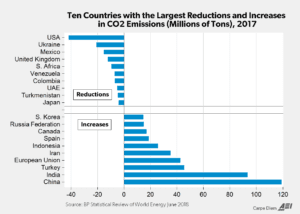Putting aside the fact that the entire “climate change” discussion is based on a long-disproven set of data abandoned even by its author, that it is physically impossible to create the electrical systems and capacity demanded by the Warming hypothesis, and that no uncorrupted global temperature data set supports “climate change,” we are left with the fact that a great many policymakers and voters in the West believe in it.
Policymakers must be expected by voters to get serious, or to acknowledge that the entire argument is, as the U.N. has stated, just a process to destroy capitalism, the most anti-poverty, wealth-creation system ever created.
That "climate change" policies will annihilate the middle class that is responsible for all progress since the Industrial Revolution is a given – and an unacknowledged goal of Progressives. The refusal to acknowledge this by the establishment is childish. If they believe in Marxism, why hide it? Tell the people the goal, why it is a beneficial goal and how to achieve it. Tell them the results of previous attempts at implementing Marxism, as well, of course.

Look who's back.
Can a policy framework be created to address function rather than form, what is seen by those who insist the Warming Emperor has clothes, but who disagree on the cut (oil or gas), the color (drilling or fracking) and the pattern (fossil, hydro or nuclear) of those clothes to meet their commitments?
The signatories to the Paris Accords believe emissions must be reduced in order to “save the planet,” and that they will meet the goals to which they agreed. Why, otherwise, would they have signed up? Are the signatories incentivized to make the changes for which they volunteered? Given their dismal performance to-date, the answer is, “No.”
People complain about President Trump having pulled-out of the Paris Accords, but remain silent about the view of the U.N.: “America Is Already Cutting So Much Carbon It Doesn’t Need The Paris Climate Accord.” As shown below, we already are reducing greenhouse gas (GHG) output faster than any signatory country. Being a Paris signatory seems primary, meeting one’s goal, secondary. These priorities are backward.

Is the point being a signatory… or reducing greenhouse gases?
In a flight of fancy in which we pretend that, yes, we can correct the global climate that has been set awry by too many American SUVs, why not formulate a policy with teeth to deal with GHG? Can we use positive and negative incentives to alter behavior in the way demanded by those who believe they are more powerful than the sun?
Yes, we can.
Let us suppose a nation “A” that has met and exceeded its GHG commitment to the Paris Accords, and a nation “B” that has not. What incentives can be used to resolve the discrepancy between commitment and performance?
A suggestion: If nation “A” has met 105% of commitment, and nation “B,” 88%, a metric to create a “Paris Transfer Payment,” or “PTP,” could be created. Nation “B” would pay annually to nation “A” a PTP on its failure of 12%, and another 5% to reward the success of “A,” for a total of 17% of this base metric, thus incentivizing both nations to continue to work toward GHG reduction. (Alternately, the 12% “stick” could be paid to a fund to help the non-industrialized world progress without despoiling the environment, but the 5% “carrot” still paid to the above-goal country.)
A sensible metric could be a percentage of GDP of each country. If we were to use, for example, 0.01% of GDP of the smaller economy as this metric, the PTP could be calculated with complete transparency. In this instance, country “B” (88% of commitment; GDP $500B), would pay a PTP to country “A” (105% of commitment; GDP $1,500B) of 17 times 0.01% of its GDP, or $850M, as a “stick,” and “A” would gain that PTP as a “carrot” for acting in the best interests of the global community of nations. This example is illustrated in Table 1.

Table One.
Those nations not having set a target for GHG reduction would have the applicable percent calculated by averaging their per-capita GHG output against the goals of nations of similar size. China and India (without which any global GHG reduction is chimerical), would be compared to countries above 200 million population (United States, Indonesia, Pakistan, Brazil), and have their GHG reduction goals set for them, and the PTP applied by the WTO via tariffs.
A nation’s choice of hydro, fracking, nuclear, oil, gas, coal, solar, wind would be theirs. The results are what matters. Form will not reduce the ocean’s rise; function will.
European nations keep telling America how backward we are; obviously they can use IP we – not they – invented, and manufacturing and distribution and energy exploitation systems we – not they – created to achieve the results we – not they – have achieved.
(This same calculation can be used in reverse to warm the planet if, as most uncorrupted temperature data sets now show, the globe is cooling. A “snowball earth” is far more of an existential threat than more food and a slightly-warmer climate.)

Who turned off the "warming"?
If meeting the Paris commitment is the goal of the signatories, how could this type of transparent, goal-oriented arrangement be rejected? A payment transfer system from those not meeting their commitments to the community of nations, to those who are is a win-win for the future and for countries taking the "climate change" issue seriously.
If nations agree to implement a carrot-and-stick PTP, we will know they are serious. If they are serious, and if they are correct in their anti-sun worship, we all will be better off. If they don’t agree to an agreement with teeth, we will know they are not serious, and can be ignored.
Article tags: AGW, Anthropogenic global warming, capitalism, climate change, GHG, greenhouse gases, Marxism, Paris Accord, progressivism, UN